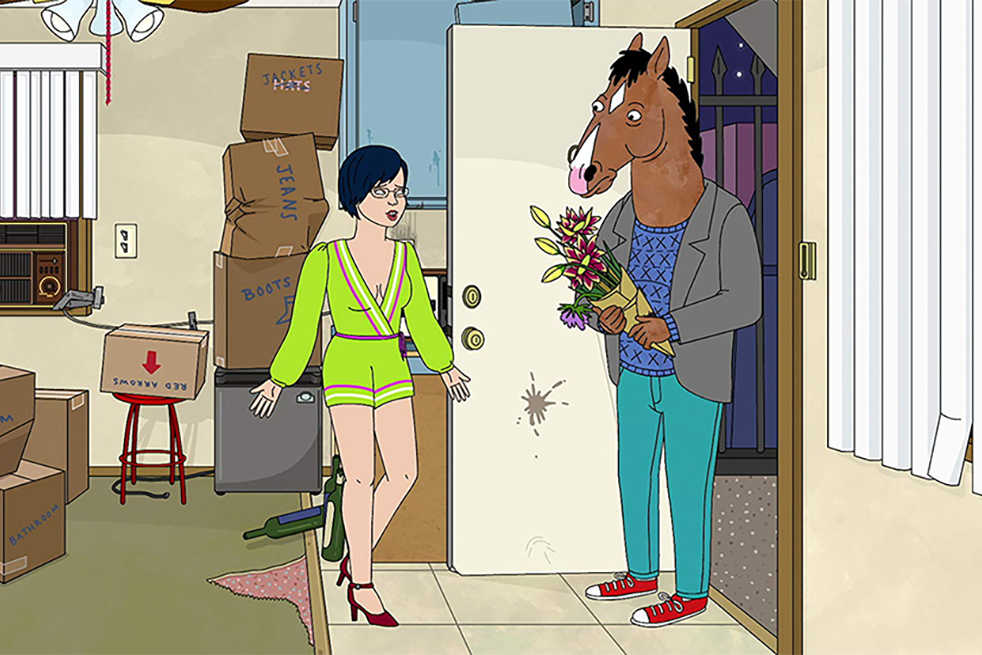It has become all too common to have “damaged” lead characters in television shows, once a rejection of an age of perfect and pristine plastic dolls laugh-tracking their way through life in the lens of the camera. Now this rejection has turned into a faux-acknowledgement of human fault, romanticizing the notion of imperfection to the degree of fetishizing personal problems and exploiting the ill for entertainment.
When fans first started watching “Bojack Horseman,” they were under the impression that it was simply another show relying heavily on that trope. Much of the show’s action and comedy derives from Bojack’s drunken-antics resulting in awkward situations, while the rest of the cast serves to complement the main action, to be the spectators to Bojack’s personal train wreck.
No matter what personal improvements Bojack seems to make, he always manages to crash back to this mangled state. With each season finale, Bojack learns some lesson about his own personal flaw and makes steps to fix himself, but always finds some other avenue with which to handicap himself in each subsequent season.
One can excuse this repetitive plot structure as a commentary on the nature of damaged people for only so long — yes, perhaps that notion holds some passing validity to those struggling with mental illness, but even if the audience takes it as truth, it understands this idea by the fourth season and tires of it eventually.
Even for a show that has eschewed the sitcom-narrative format, as is all-too-common nowadays for mature animated shows, in favor of more experimental strucutres — the narrative itself has to start to evolve, not simply the structure of the narrative.
It is therefore appropriate —and typical of a show that relies heavily on its own self-referential style of humor, constantly winking at the audience — that Bojack not only addresses these concerns, but specifically targets and mentions them frequently.
Bojack himself laments how in a television show, there can be no happy ending as a happy ending means that there is nothing more for the audience. In a later episode, Diane Nguyen, Bojack’s biographer on the show, addresses the fetishizing of flawed characters — fearing that the television show she helped pen and in which Bojack stars normalizes the self-destructive and reckless behavior shown by the on-screen character.
Bojack spends much of the season obsessing over how related his behavior is to the flawed character on screen, blurring the lines between his reality and his show —deliberate parallels the writers use to acknowledge their fault in engaging in the same exploitation of damaged behavior as other shows.
While the newly released fifth season of the show still engages with the same tropes as previous seasons — Bojack finding another self-destructive outlet for his own unresolved issues, with these issues wreaking havoc on those around him — the acknowledgement of the show’s problems within the narrative leads the viewer to believe, at the very least, something will change. And it does. The season ends on a note that is, at the very least, far more positive than previous season finale not simply because of the action Bojack takes, but because of the motivations behind Bojack’s actions as he finally pulls the trigger on something that he is reluctant to do not out of a desire to truly improve himself.
The writers pull off this narrative theme expertly while simultaneously doubling down on their creative narrative structure — more than half the episodes this season employ some form of an experimental or non-traditional plot structure — and the self-referential humor is nothing short of impressive. Bojack’s twenty-minute-long eulogy and having the entirety of an episode set at a funeral might fail spectacularly with other shows, but the writing staff pulls it off epertly.
The cast does a superb job as usual, and the addition of Rami Malek (“Mr. Robot”) and Stephanie Beatriz (“Brooklyn Nine Nine”) complement the already wonderful cast. Will Arnett (“Arrested Devlopment”) consistently blends into his role, and this is still Amy Sedaris’ best work since “Strangers with Candy.”
Calling this Netflix’s best show to date is no stretch. No other original series carries itself with the same level of maturity, no other show matches its emotional depth and no other show executes difficult themes and narratives with such apparent ease while remaining fresh and entertaining. A show of Bojack Horseman’s caliber deserves the viewer’s attention without reservation or division.
